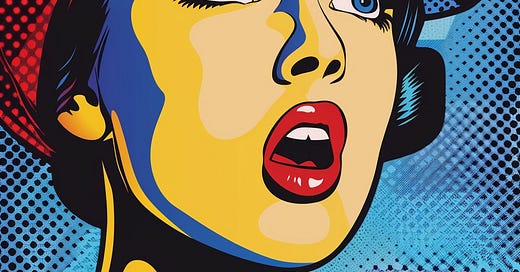Fiction Comps are BS: What Matters More
NOTE: This is for fiction only. I'm totally on board with non-fiction comps.
In my article last week I mentioned how most industry professionals follow certain conventions—such as how to write a query letter; though we might not agree on certain nuances—such as whether to personalize the query.
However, I realized there’s a fiction convention I don’t agree with: to show market salability, authors need to provide current comps (i.e. within the last two or three years) and avoid referencing evergreen classics. While I understand the rationale behind this, I don’t fully agree.
I believe comps are meant to convey the vibe of your book and put the agent/reader in the mindset of what they’ll be reading. Your book can absolutely be To Kill a Mockingbird meets A Tree Grows in Brooklyn– I’m talking plot mash-up, not style or writing prowess.
I’d even go so far to say a strong hook is good with me. Someone pitched me a “21st Century Alice in Wonderland” –enough said.
Knowing where a book fits in the market, and sits on the shelf is usually pretty straight forward. If you can’t figure out where a romance, thriller or fantasy sits or fits, I think we have bigger issues. If you write my favorite mash up The Hulk meets The Exorcist, then yes, we’ll need to discuss metaphorical shelf space.
Trends Change—And So Do Comps
My biggest issue with this requirement is the book being queried isn’t going to be in the “current market”.
By the time your book is sold – those “saleable” comps may no longer be relevant. The process of acquiring, editing, and publishing a book takes anywhere from 12 to 24 months or more. What’s trending today may not trending by the time your book hits shelves.
For example: Anne Rice’s Interview with the Vampire. When it was published in 1976, vampire novels weren’t in vogue. There was nothing on the bestseller list at the time that made it seem like a “safe bet”. Yet, shortly after its release, the book became a phenomenon that’s still relevant today.
Twilight is another. When Stephenie Meyer’s novel was released in 2005, young adult fiction wasn’t saturated with vampire stories. In fact, the biggest books at the time were the sixth Harry Potter and Scott Westerfeld’s Uglies dystopian series. And yet, Twilight quickly became a massive success.
This is not to say, write a vampire book. The point here is these books weren’t riding the wave of an existing trend; they created their own.
Telling me your story is A Wrinkle in Time meets The Golden Compass says way more to me than, “Writers will love it for the lush green landscapes of Book X and the feeling of hope it conveys like Book Y.” These elements do nothing to tell me what your story is about – nor have I ever been swayed by lush green landscapes. That’s like saying your book has the sadness of Jojo Moyes’ Me Before You – but your story is about 1936 Olympic pole vaulters.
Pop Culture Can Be Just as Useful
Additionally, it’s not just books that make good comps. Pop culture references—whether from movies, TV shows, or even music—can be equally effective, as long as they help paint a clear picture of your story. If you describe your book as Stranger Things meets The Goonies, I instantly have a solid idea of the tone and style of your manuscript. The key is choosing comps your reader will recognize and help position your book in a relatable way.
No One Rejects Great Books Over Comps
Let’s be honest, no agent or editor is going to reject a truly compelling manuscript because the comps weren’t correct. Your writing and your story need to stand out, regardless of whether you referenced a three-year-old bestseller, a classic novel or a song.
In the end, I’m not trying to talk you into anything you’re not comfortable doing. If you want to stress over finding a recent, best-seller that does little to communicate the essence of your story, that’s up to you.
As for me, I think a great story will always have a place in the market, no matter what’s trending.





I never thought of referencing a television show or song. I’ll have to give those options some thought!
Good advice, as usual. I like the comp thing as a fun brainstorming exercise. When I was in film school, it led to a script that I had a blast writing. I had just seen The Book of Mormon in New York and on the plane ride home I watched Reservoir Dogs. I thought it might be fun to mash up those archetypes and tones, and that script wrote itself in a couple of weeks.